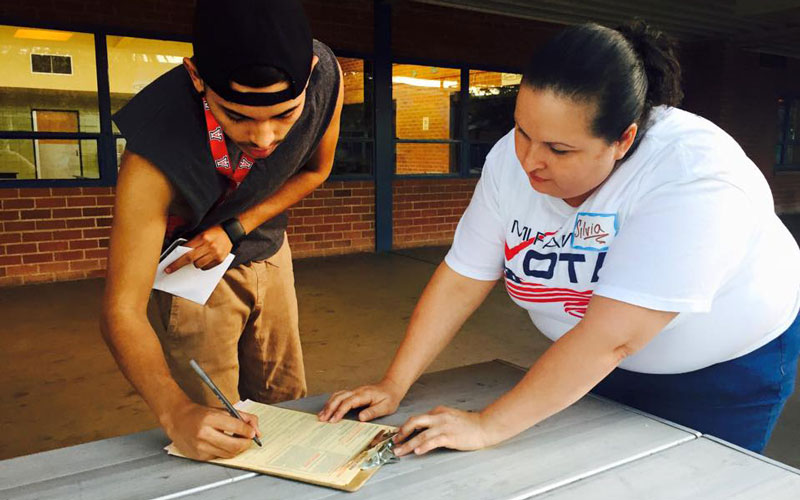
Diego Martinez Barrera (not pictured) has registered voters in the past through Mi Familia Vota, a national organization focused on expanding Latino civic participation. (Photo by Mi Familia Vota)
This time around, Diego Martinez Barrera aspires to make a difference with his vote. At age 20, he’s preparing not just to cast a ballot in his first presidential election, but to help others register to vote for the first time.
“I have family that doesn’t have that right to go out there and vote as I do,” he said. “In some ways, I represent what they can’t. I really just wish for the day where they can attain the citizenship and actually get to vote themselves.”
As U.S. primary season gets underway with the Iowa caucus next Monday, Barrera represents a new phenomenon across the country. Barrera, born in Tucson to undocumented parents, is one of the 3.2 million U.S.-citizen Latinos that reached voting age between the last presidential election and this upcoming one. Together with other millennials, these young Latino voters could bring an important message in November’s elections — if they show up at the polls.
These findings are part of a study released last week by the Pew Research Center on the effect Latino voters will have in the upcoming November elections. The study’s main finding is that millennials — those between ages 18 and 35 — will make up 44 percent of Hispanics eligible to vote in the United States.
Many will be the first to vote in their families, all too often motivated by anti-immigrant rhetoric spread by some of the presidential candidates. Many, as in Barrera’s case, are the offsprings of one or two undocumented parents.
“If I didn’t vote myself, someone else was going to be doing it for me,” Barrera said.
The millennial effect is expected to have increased magnitude in Arizona, the state with the fourth-largest group of eligible Hispanic voters in the country. Only California, Texas and New Mexico have larger bases.
“Arizona has also experienced fast growth in its Hispanic electorate, with a projected 1.3 million Hispanic eligible voters in 2016, up from 796,000 in 2008,” the report states.
About 43.3 percent of these statewide eligible Hispanic voters are millennials, compared to the 22.3 percent of eligible white voters, according to 2014 Pew numbers.
The policy issues these young Latinos care about, such as education and job availability, are shared among millennials regardless of ethnicity. There is also the added emphasis on immigration reform.
“I don’t want to see a Donald Trump win,” said Felix Gaytan, 18, who registered last year to vote and is now pushing others to register. “I want to see someone that could actually help the Latino community out.”
The sentiment is true for Araceli Becerra Gonzalez, 48, who was naturalized in 2013 and will be voting for president for the first time. She teaches citizenship classes for Latinos looking to become naturalized.
“(Trump) is serving as a tool for me,” she said in Spanish. “Because I tell people, ‘Do you want him to be our president? So what do you have to do? Become a citizen, register to vote and vote.’ People should take advantage of this opportunity to participate civically.”
Historically, Latinos and millennials represent demographic groups that have shown up in low numbers at the polls. Less than half of the 23.3 million eligible Latino voters turned out to cast ballots in 2012.
This could be due to a fundamental lack of familiarity with the electoral system, said Joseph Garcia, the director for the Morrison Institute Latino Public Policy Center at ASU.
“If you can get someone to vote once, when they just turn 18, they’re going to probably be a voter for the rest of their lives,” he said. “If they don’t (vote) that first election cycle or that second election cycle, chances are they’re going to be disengaged and they’re not going to vote.”
Garcia believes the 2016 election is still too early for young Latino voters to make a large impact in Arizona.
“There’s a lot of people looking for impact now, and it just isn’t going to happen because Latinos are largely a younger population,” he said. “They haven’t matured in voting age yet.”
He said that by 2030 there will be a much larger number of Latinos eligible to vote, which could lead Arizona in changing from a Republican-led state to a Democratic “blue” state. Even earlier, 2020, the state is expected to turn purple, meaning it’s become more politically competitive.
About 52 percent of Hispanics in the country still can’t vote because they’re either too young or are not U.S. citizens, the Pew study showed. However, many still find a way to participate in the political discussion, Garcia added.
“The DREAMers have been the most engaged and involved voice of Latinos, going door to door, trying to get people registered, trying to get people to the polls, trying to get people to understand it’s important to be heard,” Garcia said.
Jose Barboza, 24, is one of those DREAMers. Although he is undocumented, he helps register people to vote through his work with Latino-rights organization Promise Arizona.
“I usually tell them, ‘You could be the voice for me. I cannot vote. … If you could be the voice for me, it would mean a lot.’ And they usually go for it,” Barboza explained.
In Arizona, the last day to register for the presidential preference election is Feb. 22. Barboza said he’ll continue registering Latinos to vote throughout the year.